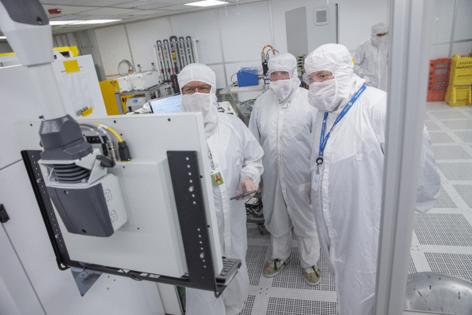SkyWater Technology, now one of biggest US chip foundries, switches growth focus to new tech
Published in Science & Technology News
SkyWater Technology is set to hit the $600 million mark in revenue next year as it takes advantage of incentives to reshore semiconductor manufacturing and the growth of a new type of computing technology.
Next year, the Bloomington, Minnesota-based company is poised to grow revenue around 40% from the midpoint of its expected 2025 revenue outlook as the recent acquisition of Fab 25 in Texas doubled its semiconductor manufacturing capacity.
SkyWater Chief Executive Thomas Sonderman originally gave the 2026 revenue outlook this summer after the Fab 25 deal closed.
“When we were created, way back eight years ago, we were well under $100 million in revenue,” Sonderman said. “We basically are reaffirming what we said in August.”
The growth statements came on top of third quarter earnings that exceeded Wall Street expectations. The company’s stock rose 27% Thursday after earnings were released after the market closed last Wednesday. The market took back some of that enthusiastic gain Friday.
With the Fab 25 acquisition, the company becomes the largest pure-play foundry in the country. Intel is still the largest manufacturer, but it only makes its own brand.
SkyWater, which has its roots in the Minnesota high-tech pioneer Control Data Corp., has flourished as a maker of chips designed by other firms that don’t need the huge output and latest chipmaking technology offered by the industry’s largest players.
That is changing, though, especially with the company’s strategy in one of the latest technologies, quantum computing, and the emphasis on reshoring chipmaking.
Quantum computing is changing the way information is calculated, and in turn makes computer analysis faster — it is key to everything from artificial intelligence to cybersecurity and automotive and pharmaceutical research.
“While quantum (computing) today is a modest component of our overall revenue, it is our fastest-growing category and a key contributor to our longer-term financial targets,” Sonderman said during the company’s earnings call last week.
SkyWater expects 30% growth in its quantum clients. On Thursday, SkyWater announced a collaboration with the Israel-based quantum firm QuamCore, bringing its quantum clients to seven. Four were added in the last quarter.
Sonderman said the key to its strategy is working with each company to develop the type of chips it needs, then when its ready for larger-scale commercial launch, becoming the contract manufacturer for them.
“We believe the future of quantum computing will not be defined by a single winning technology,” Sonderman said.
The growth in this area could allow SkyWater to capture new opportunities in key markets including automotive and industrial.
Sonderman believes it is essential that the U.S. maintains its lead in quantum computing, by keeping domestic production here.
“We have a significant amount of breadth and types of capabilities that we can apply to different quantum solutions,” Sonderman said.
The growth in quantum work, plus reshoring opportunities, is meant to offset its traditional defense industry work. Department of Defense funding has seen “stagnation exacerbated by the shutdown,” Sonderman said, and did affect third quarter profits.
Yet because of its history in the mainframe era in which Control Data was a leader, SkyWater’s factory, built in the 1980s, has long been certified as a trusted producer by the U.S. government and military. That reputation will carry in other areas, the company said.
“Our goal is to be the quantum foundry,” Sonderman said. “And the synergistic approach that we get by having a foundry model, I think, is clear, but we also have the backdrop of being a trusted fabricator for the U.S. government. And when a company comes into SkyWater, they know that their IP will be protected.”
SkyWater exceeded analyst expectations reporting third quarter revenue of $150.7 million, up 61% over the third quarter of 2024.
Results included $86.6 million in revenue from the $93 million acquisition of the Fab 25 foundry in Austin, Texas, that finalized on June 30.
SkyWater earned $144.4 million in the quarter, or $2.95 a share. That included a $110.8 million gain related to the Fab 25 acquisition. Adjusted earnings were 24 cents a share, compared with 8 cents in the third quarter a year ago.
Sonderman sees no reason that the U.S. can’t reclaim its place as a leading manufacturer of computer chips. Doing so will allow the U.S. to be less dependent on foreign suppliers.
Right now, about one-half of foundational node devices used in defense systems are built in Taiwan or mainland China.
SkyWater’s strategy of working with companies to help them develop and print their technology will be a key piece of the reshoring trend. “We think that the new paradigm is the one we’re creating,” Sonderman said.
A year ago SkyWater got $16 million in federal funding and more in state funding to upgrade its plant in Bloomington.
Other local companies, including Bloomington-based Polar Semiconductor, have also received federal funding to reshore semiconductor manufacturing.
The sector in the Twin Cities added a new player, too. Alter Technology, a U.S. subsidiary of German Tüv Nord Group, opened a testing center in Plymouth.
Like other business leaders Sonderman is frustrated with the government shutdown and the uncertainty around tariffs, which makes business planning more challenging.
“The government is playing a bigger role in semiconductors and in quantum and that is all fantastic,” Sonderman said. “But certainty is also something that is important.”
©2025 The Minnesota Star Tribune. Visit at startribune.com. Distributed by Tribune Content Agency, LLC.







Comments